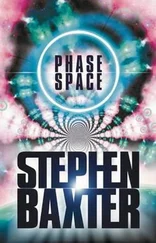His glove, pristine white a moment ago, was already caked black with dust. He knew the blackness came from carbon-rich compounds. There were hydrates too: water, locked up in the rock, just drifting around out here. In fact rocks like Ra were the only significant water deposits between Earth and Mars. It might prove possible to use the rock’s resources to close the loops of mass and energy circulating in Ehricke’s life support, even on this preliminary jaunt.
Ra could probably even support some kind of colony, off in the future. So it was said.
Greenberg had always preferred to leave the sci-fi stuff to the wackos in the fringe study groups in NASA, and focus on his checklist. Still, it was a nice thought.
He allowed himself a moment to savour this triumph. Maybe he would never get to Mars. But he was, after all, the first human to touch the surface of another world since Apollo 17.
He pushed his hand back into the pit he’d dug, ignoring the fresh dust he raised.
The cloud was scattered, thin and dark, across ten light years. It was gas laced with dust grains – three-quarters hydrogen, the rest helium, some trace elements – visible only to any observers as a shadow against the stars.
When the supernova’s gale of heavy particles washed over it, the cloud’s stability was lost. It began to fall in on itself.
In a ghostly inverse of the inciting supernova explosion, the core of the cloud heated up as material rained in upon it, its rotation speeding up, an increasingly powerful electromagnetic field whipping through the outer debris. The core began to glow, first at infra-red wavelengths, and then in visible light.
It was the first sunlight.
Oliver Greenberg was bored.
He was actually glad to get the call from Gita Weissman about the balky rock splitter in Shaft Seven, even though the lost time would mean they weren’t going to make quota this month.
At least it made a change from the usual CELSS problems, CELSS for closed environment and life-support systems, a term nobody used except him any more. Even after a century, nobody had persuaded a pea plant to grow nice straight roots in microgravity, and the loss from the mass loops in the hydroponic tanks continued at a stubborn couple of per cent a month, despite the new generation of supercritical water oxidizers they used to reduce their solid wastes.
It’s still about pea plants and plumbing, he thought dismally.
He started clambering into his skinsuit, hauling the heavy fabric over his useless legs.
He took a last glance around the glass-wall displays of his hab module. It shocked him when the displays showed him he was the only one of Ra’s two thousand inhabitants on the surface.
Well, hell, it suited him out here, even if it had stranded him in this lonely assignment, monitoring the systems that watched near-Ra space. Most of the inhabitants of Ra had been born up here, and lived their lives encased in the fused-regolith walls of old mine shafts. They didn’t know any better.
Greenberg, though, preferred to keep a weather eye on the stars, unchanged since his Iowa boyhood. He even liked seeing Earth swim past on its infrequent close approaches, like a blue liner on a black ocean, approaching and receding. It made him nostalgic. Even if he couldn’t go home any more.
Suited up, he shut down the glass-wall displays. The drab green walls of the hab module were revealed, with their equipment racks and antique bathroom and galley equipment and clumsy-looking up-down visual cues. This was just an old Space Station module, dragged out here and stuck to the surface of Ra-Shalom, covered over with a couple of metres of regolith. He was tethered in the rim shadow of Helin Crater, the place he’d landed on that first jaunt in the Ehricke. And that had been all of a hundred years ago, my God.
He pushed his way through the diaphragm lock set in the floor of his hab module. He was at the top of one of Shaft Two, one of the earliest they’d dug out, with those first clumsy drill-blast-muck miners. It was a rough cylinder ten metres across, lined with regolith glass and hung with lamps and tethers; it descended beneath him, branching and curving.
He grabbed hold of a wall spider, told it his destination, and let it haul him on down into the tunnel along its stay wires.
Thus, clinging to his metal companion, he descended into the heart of Ra-Shalom.
His legs dangled uselessly, and so he set his suit to tuck them up to his chest. He was thinking of taking the surgeons’ advice, and opting for amputation. What the hell. He was a hundred and fifty years old, give or take; he wasn’t going to start complaining.
Anyhow, apart from that, the surgeons were preserving him pretty well. They were treating him to a whole cocktail of growth hormones and DHEA and melatonin treatments and beta-carotene supplements, not to mention telomere therapy and the glop those little nano-machines had painted on the surface of his shrivelled-up brain to keep him sharp.
These guys were good at keeping you alive.
This asteroid was small. A stable population was important, and a heavy investment in training needed a long payback period to be effective. So the birth rate was low, and a lot of research was directed to human longevity.
He understood the logic. But still, he missed the sound of children playing, every now and again. The youngsters here didn’t seem to mind that, which made them a little less than human, in his view. But maybe that was part of the adjustment humans were having to make, as they learned to live off-Earth.
In fact he missed his own kids, his daughters, even though, astonishingly, they were now both old ladies themselves.
The surgeons had even managed to repair some of the cumulative microgravity damage he’d suffered over the years. For instance, his skeletal and cardiac muscles were deeply atrophied. Until they found a way to stabilize it, his bone calcium had continued to wash out in his urine, at a half per cent a month. At last, the surgeons said, the inner spongy bone, the trabeculae, had vanished altogether, without hope of regeneration.
He never had been too conscientious about his time in the treadmills. It had left him a cripple, on Earth.
So, at age eighty, he’d left Earth.
Even then they had been closing down the cans – the early stations starting with Mir and the Space Station, that had relied completely on materials brought up from Earth. In retrospect it just didn’t make sense to haul material up from Earth at great expense, when it was already here, just floating around in the sky, in rocks like Ra.
So he’d come back to come out to Ra-Shalom, the place that had made him briefly famous.
He suspected the surgeons liked to have him around, as a control experiment. The youngsters were heavily treated from birth, up here, to enable them to endure a lifetime of microgravity. Not a one of them could land on Earth, of course, or even Mars. But not too many of them showed a desire to do any such thing.
The wall spider, scuttling busily, brought him to the mine face, the terminus of Shaft Seven. It was a black, dusty wall, like a coal face. There was dust everywhere, floating in the air.
There were five or six people here, in their brightly coloured skinsuits, scraping their way around the stalled miner. Their suits were seamless and without folds, to guard against the dust. They were all tall, their limbs spindly as all hell, their skeletal structures pared down as far as they would go.
The miner itself clung to the walls with a dozen fat legs, with the balky rock splitter itself held out on a boom before the face. It was a radial-axial design with a percussive drill, powered by hydraulics, with a drill feed, a radial splitter and a loader. But for now it was inert.
Читать дальше












